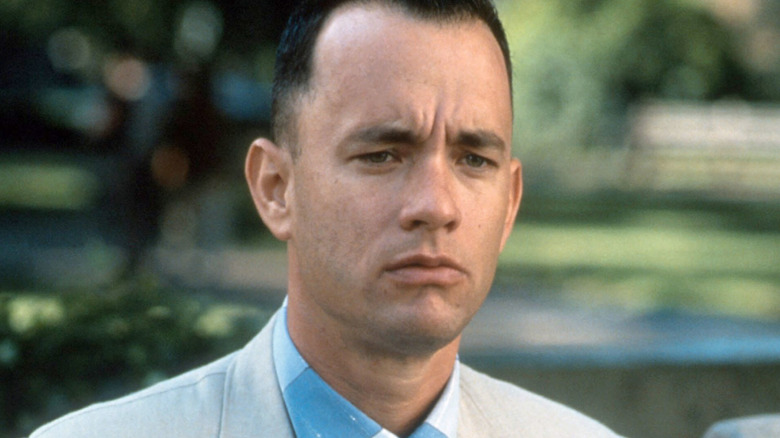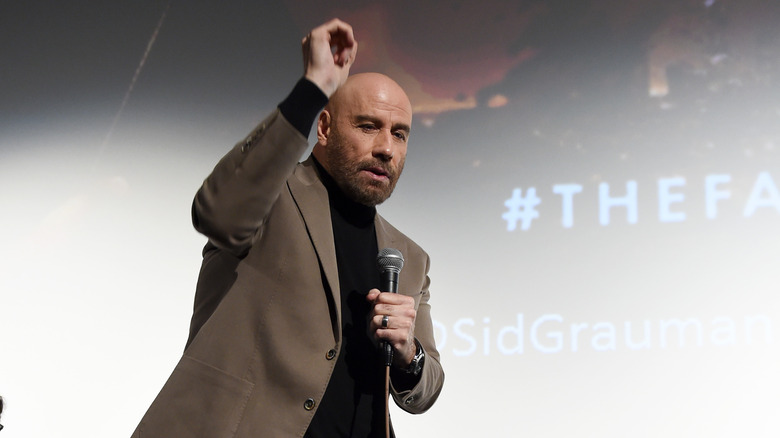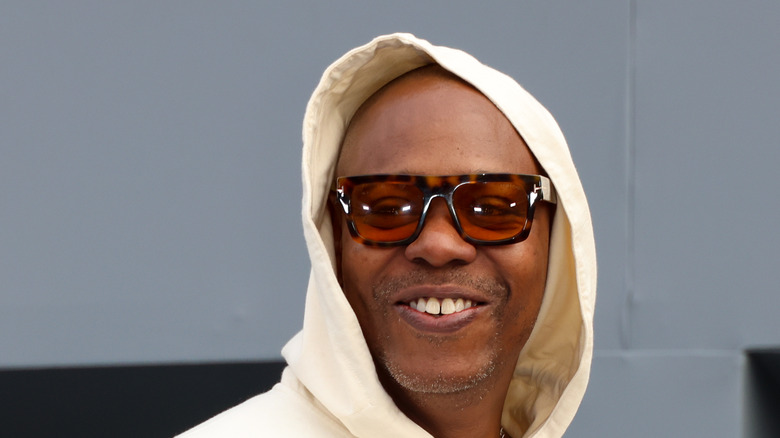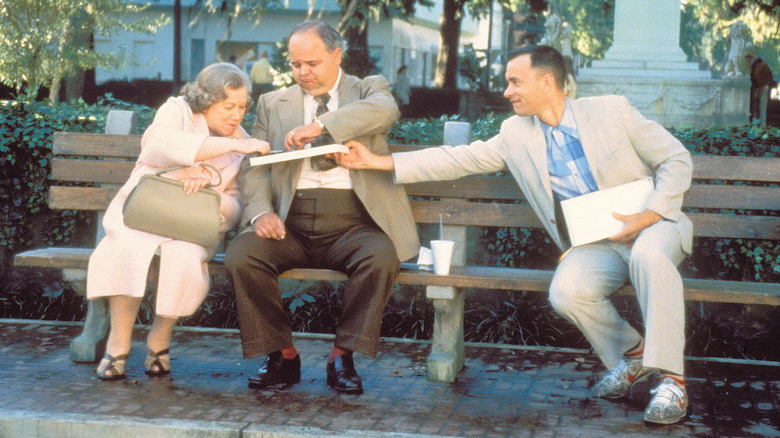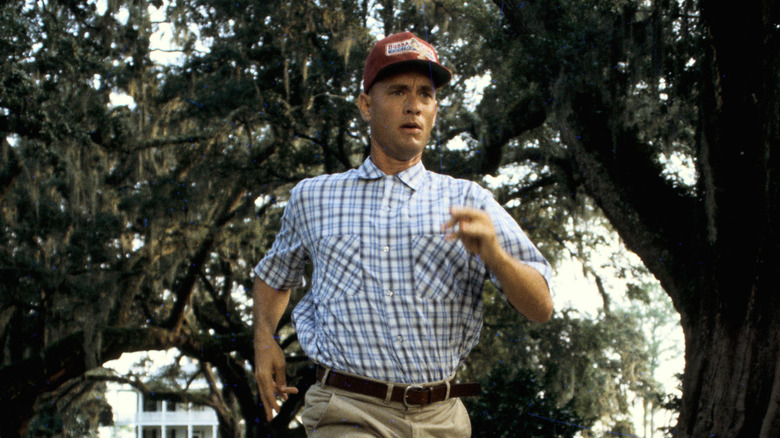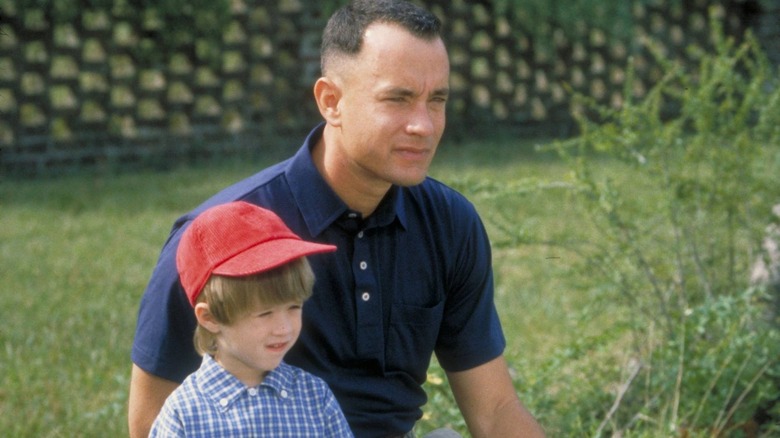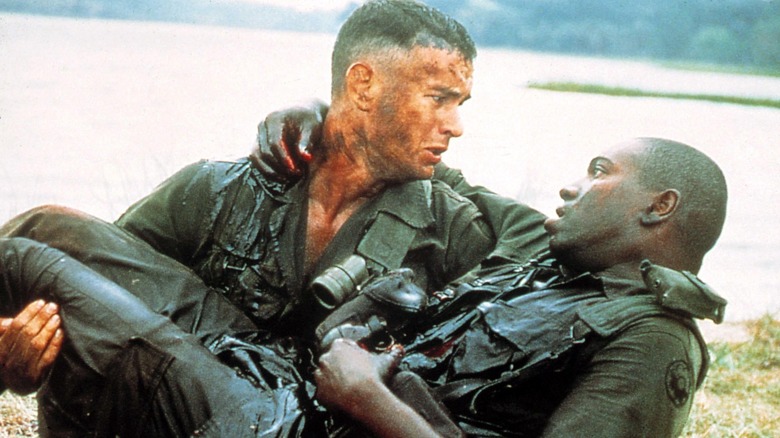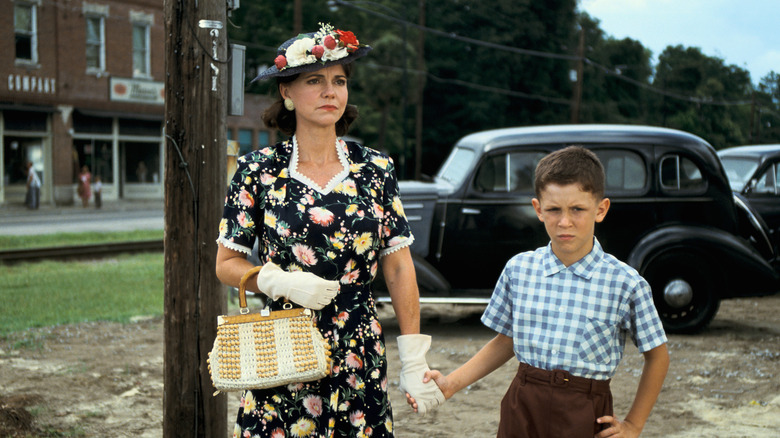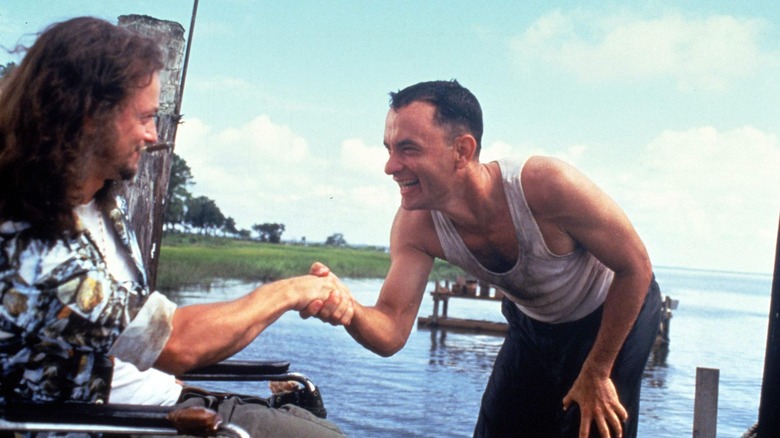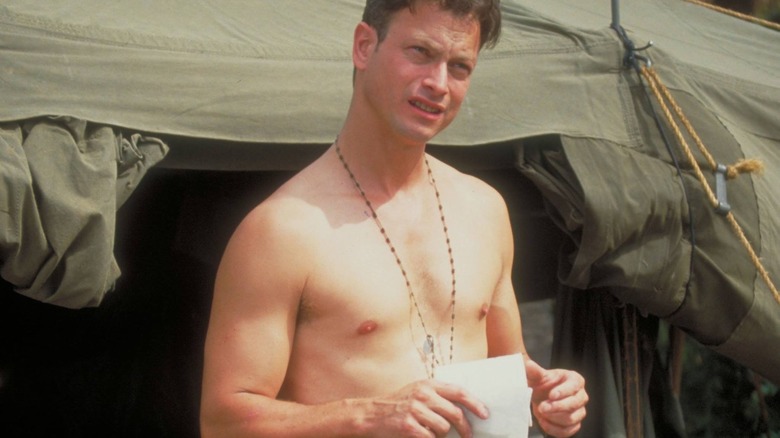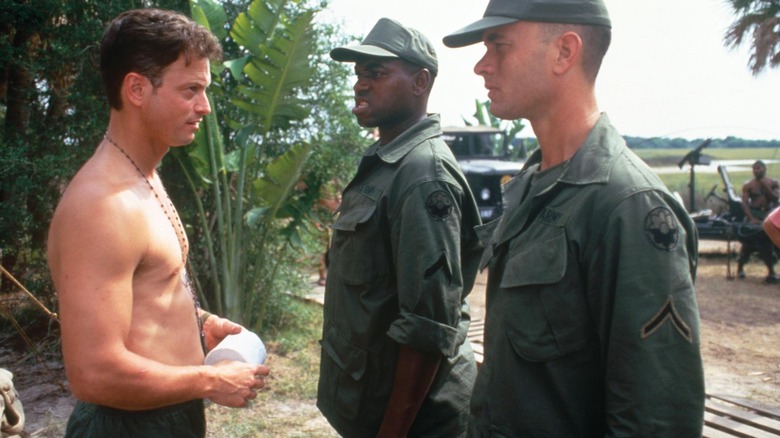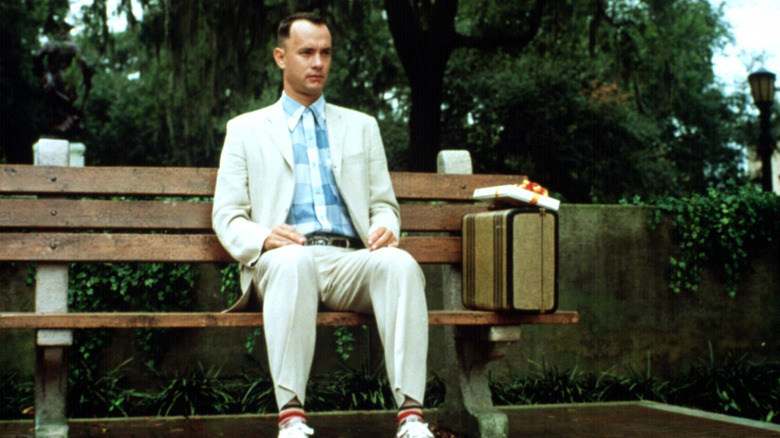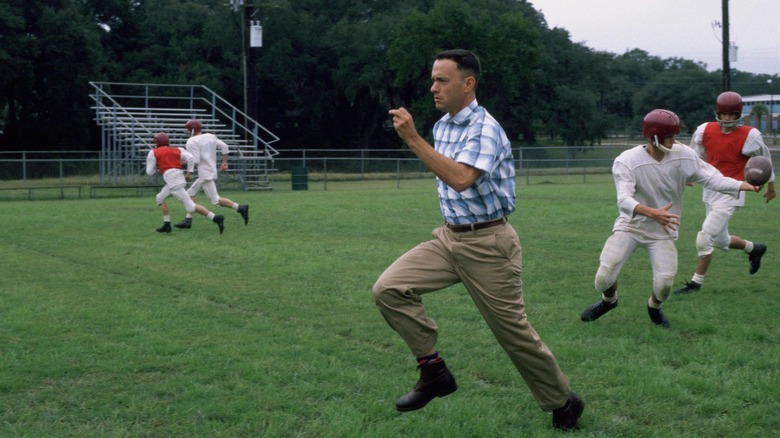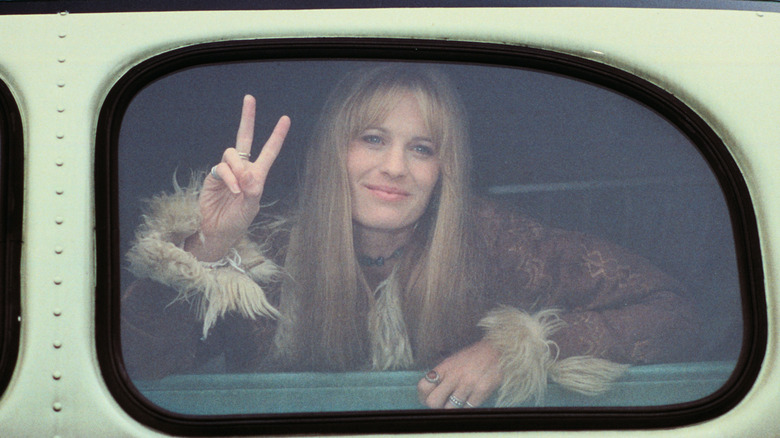The Untold Truth Of Forrest Gump
On paper, a film about a peculiar character from Alabama named "Forrest Gump" recounting his life story to assorted strangers on a public bench doesn't sound all that riveting. That is until you realize the guy in question was a Vietnam war hero who accidentally taught Elvis Presley to dance, inspired John Lennon to write the lyrics to "Imagine" and indirectly exposed the Watergate scandal. Add a little exceptional acting ability in the shape of Tom Hanks and some directorial magic in the form of Robert Zemeckis and you've got an all-time Hollywood classic.
The movie isn't just the story of a man called Gump, it's that of modern America, and famous lines from the film such as, "Life is like a box of chocolates," have become part of the fabric of popular culture.
At the 1994 Academy Awards, it scooped six Oscars including Best Director, Best Actor in a Leading Role, and to the surprise of many, beat Quentin Tarantino's "Pulp Fiction" to land the coveted Best Picture. Some critics derided the film as a "totem of boomer nostalgia," but in an interview with The New York Times, Hanks said the problem was "Forest Gump" earned a lot of money, "If we'd just made a successful movie, Bob and I would have been geniuses." Love it or loathe it, "Forrest Gump" is a heartwarming tale whose main takeaway is not to ever judge a book by its cover. Here are some other things about the film you might not have known.
John Travolta said no to Forrest Gump
Imagining John Travolta as "Forrest Gump" is a stretch for even the most nimble imagination. It's Tom Hanks and his everyman looks and slight air of awkwardness that were a perfect fit for the character. In hindsight, the star of "Saturday Night Fever" and "Grease" has a natural cool and graceful ease that probably wouldn't lend itself well to a universal underdog like Gump. Yet director Robert Zemeckis begged to differ and according to The BBC, Travolta was his first choice for the role. Why exactly Travolta turned down the chance to run in Gump's shoes, is unspecified. Perhaps it was because a young moviemaker named Quentin had come calling and was eager for Travolta to star as hitman Vincent Vega in his next film, "Pulp Fiction."
In an interview with MTV News, when asked if he had any regrets about passing on films such as 'Forrest Gump" or "Chicago" Travolta simply replied that he was happy to give other actors such as Tom Hanks the chance to build their brand. He mentions he also passed first dibs on another Hanks' vehicle, "Splash," and several Richard Gere films. Yet he insists, "I'm pleased I can share the wealth." Travolta elaborated that if he didn't commit to parts that Hanks or Gere later made famous, he was busy elsewhere doing equally as important and rewarding work. He said, "I feel good about some (roles) I gave up because the other careers were created."
Dave Chappelle turned down Bubba Blue
Benjamin Buford Blue, or as he's more commonly known, Bubba! is an essential part of "Forrest Gump." Played by Mykelti Williamson, he has a heart just as big, and a personality just as out of step with the world, as Forrest. They forge the sort of friendship only two outsiders can, but it ends dramatically with Bubba's death in the Vietnam jungle. It's hard to imagine Bubba being played by the wisecracking and razor-sharp Dave Chappelle. Nevertheless, the controversial comedian and actor was a shoo-in for the role of Bubba but declined because he felt it leaned too heavily on racial stereotypes (via Comedy Hype).
Chappelle's agent had explained the part would be a critical success and could lead to an Oscar. Upon reading the script, Chappelle was unconvinced and felt the Bubba character was almost a racial slur and turned down the film. In a stand-up routine, Chappelle joked, "Who could be dumber than Forrest Gump? His best friend that's who. No matter how dumb a white dude is they'll always find a black man that's dumber than him." According to Showbiz Cheatsheet, the late rapper Tupac Shakur had fewer reservations about playing Bubba. His wife, Keisha Morris, said he had unsuccessfully auditioned for the part but still took her to see the film on their first date.
Forrest Gump was adapted from a book
"To Kill a Mockingbird," "The Godfather," "The Exorcist," "Harry Potter," "Fight Club," and "Lord of the Rings" are all equally famous in print and on celluloid. Yet you wouldn't put "Forrest Gump" on that list, because the book of the same name it's based upon is nowhere near as famous as the movie. According to The New York Times, author Winston Groom had only one legitimate complaint about the film and that's the lack of readers who picked up his 1986 novel for the first time around. "Where were you eight years ago? It's the same damn book," exclaimed Groom. Before the film, the book still sold a solid 30,000 hardback copies. However, after Hollywood sprinkled its magic dust it took off into the stratosphere and sold millions.
The author hit upon the idea for the book after his father told his a story from his childhood about a piano-playing boy who wasn't as quick-witted as everyone else. Groom then watched a documentary about savant syndrome and the germs of "Forrest Gump" were born. The novel was done and dusted in six weeks. Groom explained, "It wrote itself. It's almost like the lizard part of my brain went into gear... It will never happen to me again." The novel is darker and a lot more complex than the film, and a marijuana-smoking Gump adds astronaut and chess grandmaster to his portfolio of achievements.
Yet although there are many differences between the book and film, Groom emphasized, "They kept the character pretty much as I intended. As I see it, it's a story about human dignity, and the fact that you don't have to be smart or rich to maintain your dignity even when some pretty undignified things are happening all around you."
Jim Hanks doubled for his older brother
"Forrest Gump" is famous for his prowess at running. After deciding one morning to go for a run he ends up running for three years, two months, 14 days, and 16 hours until he has completed a back-busting amount of miles and covered all corners of the United States. That's a lot of leg work (via YouTube). Yet as always with film, what you see isn't exactly what you get. Gump's peculiar gait that involves lifting his knees and arms as much as possible takes its toll. And so a body double was called on in the shape of Tom Hanks's brother, Jim.
People reports that in many of the scenes where Gump makes his way across America doing something which resembles an Irish dance gone wrong, Jim Hanks was called on to carry the burden. There were other doubles on set but according to Jim, none had the requisite Hanks' DNA to get the high-kneed run just right. He explained, "Tom had other doubles, but they couldn't do the run. That's a stupid Hanks thing." British runner Rob Pope sought to emulate Hank's character in 2018. Today reported that Pope covered 15,300 miles of American soil in 420 days. That's 52 more than Gump completed in the movie. The long-distance runner who is a huge fan of the movie explained, "I had been thinking about it for 15 years. I kept talking about it to where it got to the point where it was time to put up or shut up."
Big break for Haley Joel Osment
Before Haley Joel Osment became world-famous as the haunted-looking kid who made the phrase, "I see dead people" famous in "The Sixth Sense," he played the five-year-old son of "Forrest Gump." Although it was only a bit part the role of Forrest Jr. opened the doors to bigger and better things. The Guardian reports that it was his screen debut in a 1993 Pizza Hut commercial that attracted the attention of the "Forrest Gump" casting director. Osment did a screen test with Hanks and the chemistry between the two was apparent.
The screen test still does the rounds on social media and Osment has called Hanks "a great first cinema dad" (via Today). Reflecting on the time when Robert Zemeckis called for a last-minute change to the script, Osment explained that he and Hanks were summoned to the trailer and, "Tom wrote down my lines down on a piece of yellow legal paper. I still have this little piece of film history."
A sequel novel but not another movie
"Forrest Gump" was a critical and commercial success, and if it had been released today, it would probably mark the beginning of a lucrative franchise. Yet to date the only sequel has been a follow-up novel. Published in 1995 and written by Winston Groom, "Gump & Co." features old favorites such as Lieutenant Dan. Once again Gump is up to seemingly impossible tricks such as reviving the fortunes of a struggling New Orleans Saints and inventing a new type of Coke (via Kirkus). He also triggers a riot responsible for tearing down the Berlin Wall and helps to capture none other than Saddam Hussein.
Screenwriter Eric Roth hammered out a script for "Forrest Gump 2." It differed significantly from the book but never materialized in film form. In an interview with Yahoo! Roth explained that the September 11, 2001, terrorist attacks were responsible for nipping the sequel in the bud. Roth explained he turned the script in the day before the attack on the Twin Towers, and in the aftermath, everyone agreed "This movie has no meaning anymore." The planned plot for "Forrest Gump 2" appears quite grim. Roth elaborated, "It was gonna start with (Forrest's) little boy having AIDS. And people wouldn't go to class with him in Florida." Other notable plot developments included Gump being an accomplished ballroom dancer, waltzing with Princess Diana, and being in the back of OJ's Bronco during the infamous police chase. Yet as Roth points out, "When 911 occurred everything we wrote felt meaningless."
Tom Hanks based his accent on the actor who played the young Forrest Gump
If there's one thing that stands out from Tom Hanks' performance in Forrest Gump, it's that slow, methodical, and unmistakable drawl that could only have been cut and refined in the deepest parts of the South. During an interview on The Graham Norton Show, Hanks revealed that Gump's signature accent was inspired by the actor who played the young Gump in leg braces, Michael Conner Humphreys. Because of his strong Mississippi accent, Humphreys tended to use a hard "g" in his pronunciation and had a tough time trying to sound like Hanks. So Hanks decided he would strive to sound more like Humphreys and Gump's iconic accent was born.
Hanks explained, "Somewhere I have cassettes, hours and hours of me just making chit-chat with a very young Michael Conner Humphreys. He was 7, 8 years old. He was a young man and that was the vernacular that we spoke in and that was priceless." Despite being the inspiration for the accent that launched a million imitators, Humphreys didn't attend the Oscars ceremony where "Forrest Gump" swept the board because his parents couldn't afford a ticket (via The Daily Mail). Humphreys explained, "The tickets were going to cost a lot of money, so we decided to just watch it on TV like everyone else."
Humphreys would later turn his back on Hollywood and choose a career in the military instead. He served four years as an infantry soldier in the U.S. Army where his nickname was, you guessed it, Gump!
Tom Hanks and Gary Sinise
Some actors create chemistry together that crackles, snaps, pops, and engages the audience with its striking dynamic. "Forrest Gump" was the first time Tom Hanks and Gary Sinise worked together but it wouldn't be the last. As Lieutenant Dan, Sinise played Gump's platoon leader in the Vietnam War and later buddied up with his fellow veteran in the Bubba-Gump Shrimp Company. Gump never gives up on Sinise, and their opposing extremes of character and interplay help create one of the film's most defining relationships. The two actors would work on a further two films together, "Apollo 13" and the "The Green Mile." Both were nominated for Best Picture Oscars but unlike "Forrest Gump" they didn't have the legs to cross the finish line.
To honor Sinise's decades-long commitment and service to military veterans and their families, a special thank-you video was made. It consisted of various actors, directors, veterans, and first responders (via People). In a heartfelt message to Sinise, Gen. Colin Powell said, "Thank you for all the things you have done for our men and women who have served our nation. Not only what you've done for them but their children, what you've done for their families, what you've done to help them rebuild your lives." At the end of the video, Tom Hanks pops up smiling and simply said, "Thanks, Lieutenant. Dan!"
Gary Sinise named a band after his character
There aren't many characters from films that have had a band named after them, but "Forrest Gump's" Lieutenant Dan has. The rock group's bass player and founding member is none other than Gary Sinise (via Eighties Kids). For nearly 20 years The Lt. Dan Band has toured military bases across the world, playing cover versions of classic songs and raising money for military veterans. As the son of a Korean War vet, the grandson of a First World War soldier, and the nephew of two uncles who fought in World War 2, Sinise is familiar with the plight of veterans.
In the role of Lieutenant Dan, Sinise also drew heavily on the experiences several members of his wife's family had while serving in Vietnam. He even borrowed the dog tags and rosary for the part from his bother-in-law.
Sinise explained to Forbes one of the contributing factors in putting together the band was how in the 1980s he saw firsthand the universal difficulties and personal demons Vietnam veterans had to fight when returning from the war. He was dismayed by the lack of support structures in place, which only aggravated the situation, and decided to help those returning from future conflicts. He said, "When we began deploying to Afghanistan and Iraq I felt there was a role for me to play in trying to ensure that today's veteran would have the support and appreciation they deserved before, during, and after the battle."
In his memoir "Grateful American," Sinise wrote that his "Forrest Gump" character has inspired many veterans, and that Lt. Dan has become a symbol of awareness.
Vietnam scenes were set in South Carolina
Just as you can never judge a book by its cover, you can never assume a movie location is where the filmmaker wants the audience to believe it's set. In "Forrest Gump" the Vietnam scenes were not shot in Southeast Asia but in South Carolina. The Smithsonian reports that the Vietnam War beach scenes were filmed in Hunting Island State Park, which is a jewel in the crown of South Carolina and attracts crowds of millions every year. It's an unlikely place for a war to rage, but Hollywood is capable of the strangest alchemy.
Forrest's fictional childhood town, Greenbow, Alabama was also located in South Carolina. Many of the film's iconic buildings such as the boarding house where Forrest grew up and the farm where Jenny lived were made for the film and located in Yemassee and Beaufort, both real-life small towns. Unfortunately, the buildings "Forrest Gump" helped make famous are no longer standing because the wrecking ball swung not long after filming finished.
The famous bench wasn't real
Along with other movies featuring famous bench scenes such as "Good Will Hunting," "JFK," and "Finding Neverland," "Forrest Gump" takes the beauty of conversing with other people on a public bench to new levels. The Savannah Park bench in Georgia where the world was first introduced to "Forrest Gump," as he sat awkwardly and regaled strangers with gems of wisdom about life being like a box of chocolates, is one of the most famous benches in cinematic history. Yet here's the rub! The Smithsonian reports that Gump's bench wasn't real and only placed in Savannah Park's Chippewa Square for the duration of the film.
According to The Historic Savannah Theatre, the bench was a simple movie prop. Yet realizing the cultural significance it would later embody, the bench was not destroyed or recycled after use but earned a select place in the Savannah History Museum. Sitting pretty for posterity the iconic bench has become a pop-culture treasure in the same vein as the ruby slippers Dorothy wore in "The Wizard of Oz." Even without the bench, Chippewa Square in Savannah Park is still a popular place for tourists to visit and snap a picture of the empty space where "Forrest Gump's" bench once stood.
Tom Hanks says every interview leads to Forrest Gump
Tom Hanks is an accomplished actor who has enjoyed an industrious and glittering career. He has been nominated for six Oscars and won two. His portfolio of characters is diverse and he never seems to give less than 101 percent to the parts he plays. The Evening Standard reports that in 2016 the great Hollywood everyman was awarded the Presidential Medal of Freedom by Barack Obama. Apart from the roles he made famous, millions of kids grew up associating Hanks' voice what the character of Woody from "Toy Story."
Yet Hanks revealed in an interview that it's the character of "Forrest Gump" that sooner or later everyone want to talk about. "Every interview will be about "Forrest Gump" at some point," Hanks told the audience and guests on The Graham Norton Show. Hanks also revealed that when the movie comes on TV, his wife is always a big fan of the scene where Gump is running away from the camera. Hanks explained that he was working out and running a lot during that period and, "My butt-ocks! As Forrest would say, were as firm as tinned hams."
The role paid off for Tom Hanks
A movie can have star names, a talented director, knockout script, and huge budget, yet its critical or commercial success is never guaranteed. Everyone involved with "Forrest Gump" in its early stages had no idea the giant film it would eventually turn into. Although it's been knocked off its perch by a glut of subsequent blockbusters, in 1995, The New York Times reported that "Forrest Gump" was the third-biggest-grossing film in history. However, before it became a runaway success, both Tom Hanks and director Robert Zemeckis took a reduction in their upfront fee, but struck a bargain for a piece of the box office gross receipts. Wise move!
Indie Wire reports that apart from the critical success and Best Actor Oscar he won for "Forrest Gump," Hanks would also go on to net an estimated profit of $65 million. Not a bad day at the office when you consider Paramount's total budget for the production was $55 million. In an interview with In Depth with Graham Bensinger, Hanks revealed that the deal sweetener was himself and Zemeckis agreeing to pay out of their upfront fees for two scenes in the movie, including Forrest's famous run across the states. Hanks told Paramount, "We'll give you the money back, but you guys [Paramount] are going to have to share the profits a little bit more. Which the studios said, 'Fabulous, great, OK.' And it was good for us, too" (via IndieWire). You betcha!
